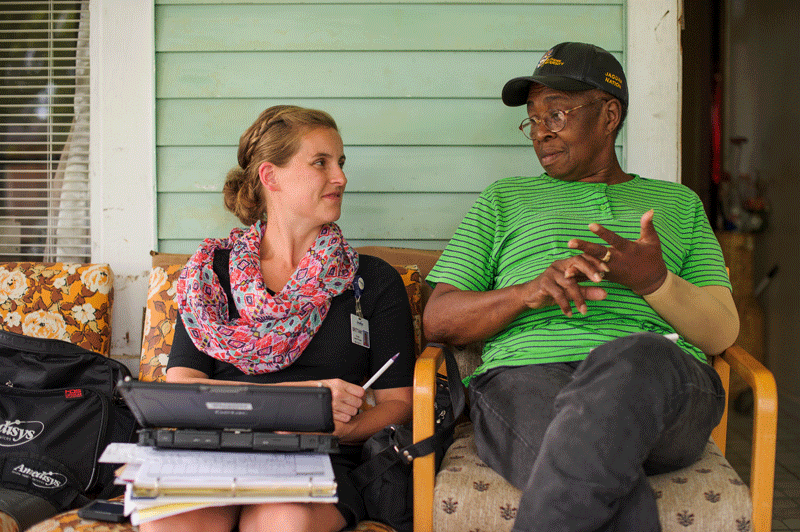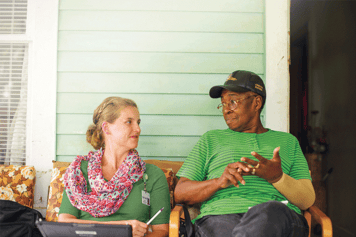Losing someone you love is very hard. Everyone grieves in their own way, and there is not a right or wrong way to feel. Grief can affect your body, mind, heart, spirit, and relationships. There is no set time for how long you will grieve.
Bereavement services are here to help. They give support so you don’t have to face grief alone. These services are available to the family and caregivers of people receiving hospice care. This support can help you identify strengths, difficulties, stressors and coping skills that will help you adapt to a significant loss in your life.
In this article, we’ll learn more about the bereavement process and how hospice bereavement services play an important role in coping with loss and grief in the weeks and months after a loved one’s passing.
What is the Meaning of Bereavement?
Many people think that grief and bereavement are the same thing, but they have different meanings. Grief is the feeling of sadness and loss. It is a normal reaction. Bereavement is the time after someone dies when you feel that grief.
There are some common feelings of bereavement: 1
- Changes in appetite
- Difficulty accepting the reality of the loss
- Feelings of guilt
- Feelings of anger
- Trouble sleeping
- Crying often
- Unable to focus or concentrate
Over time, as a person moves through the stages of grief, these symptoms will get better. For most people, that’s within six months to one year. For some— about 7-10%— grief can last beyond 12 months. Further care may be needed for prolonged grief disorder. 2
The Five Stages of Grief
The five stages of grief have been identified by Elizabeth Kübler-Ross, a Swiss-American psychiatrist. Each person’s journey through these stages will have its own timeline. It’s possible to move through a stage more than once during the bereavement process.
These are the five stages:
- Denial — Not believing the person is gone
- Anger — Feeling mad at others or at the person who died
- Bargaining — Thinking “what if” or making deals with a higher power
- Depression — feeling hopeless, deeply sad or even withdrawn
- Acceptance — Realizing the person is gone and remembering good times
What are Hospice Bereavement Services?
Hospice care provides pain and symptom management for people with a terminal illness who aren’t expected to live longer than six months. But hospice services do not end when the person dies.
As part of the Medicare hospice benefit, family caregivers and close friends may receive bereavement care from the time of the patient’s admission until 13 months following the patient’s death. 3
Bereavement services activities provide meaningful, anticipatory grief support to hospice patients and their loved ones prior to the patient’s death and include:
- Phone calls and visits to check in
- Bereavement support groups
- Memorial services
- Help finding local counselors or support
- Written materials (cards, letters, booklets)
- Events to remember your loved one (Tree Planting, Veteran Remembrances)
- Grief support around the holidays
- Facility/community grief education and support
Bereavement services can offer hope that those left behind can survive the loss, helping you feel supported and giving ways to cope with your grief.
Who Provides Hospice Bereavement Services?
Hospice bereavement services are provided by trained and experienced chaplains, social workers and bereavement coordinators. They are part of the Amedisys hospice team with nurses, hospice aides, physicians and volunteers. Their role is to provide emotional and grief support, helping people navigate through the losses.
- A chaplain or spiritual counselor supports the patient and family by talking with them about their faith, helping them find meaning and peace that matches with their beliefs and values.
- A hospice social worker provides support by listening, supporting, and connecting you with help. This includes community services available. A bereavement coordinator helps the patient and family make a plan for grief support.
Bereavement services and support can also be provided in preparation for a loved one’s death, in addition to after a loved one’s passing. For those patients receiving hospice care at home, there are opportunities to say goodbye and be part of a peaceful passing.
Discussing our loved ones wishes for their death can be an important part of your own grieving process. It’s important to find out what each individual considers a good death, so their wishes can be honored. This can offer you peace and comfort that you’ve met your loved one’s needs and wishes.
How Bereavement Services Support Coping
Hospice bereavement services can help you feel less alone. Some helpful ideas may include:
- Write a letter to your loved one
- Give yourself permission to feel grief, rather than avoiding feelings
- Understand intense feelings may come and go and are normal
- Talk about your feelings — with a friend, family member or therapist
- Journal about happy memories of your loved one
- Join a support group
- Learn how to handle difficult times like birthdays and holidays
It is important to memorialize and honor your loved one. Doing something to remember your loved one, like planting a tree or making a scrapbook, can also help.
How to Access Hospice Bereavement Services
After a hospice patient dies, Amedisys hospice will immediately assign a bereavement coordinator, who will reach out. They will ask about how you’re doing and offer support. They can help you choose the kind of help that works best for you.
Everyone grieves in their own way. You don’t have to go through it alone. Amedisys hospice bereavement services are here to support you every step of the way.
Kimberly VanGilder, RN, is a Hospice Clinical Education Specialist for Amedisys. She has been a nurse for 15 years, discovering early in her career that hospice was both her calling and her passion. Kimberly strongly believes in the value of education and finds great fulfillment in learning and sharing knowledge with others.





